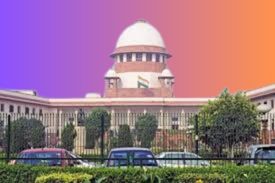Filed by the contemnors who stood punished by the High Court (Para 3)
Filed at the instance of the beneficiaries of contemptuous transactions with the permission of this Court. (Para 3)
We impose cost of Rs. 1,00,000/- (Rupees One Lakh only) on accused Nos.3.1 and 3.2 in lieu of sentencing them to imprisonment (Para 5(ii))
We sentence accused Nos. 3.3, 3.4 and accused No. 4 to undergo simple imprisonment for a period of two months and pay fine of Rs. 2,000/- (Rupees Two Thousand only) (Para 5(iii))
hereby ordered to be cancelled, quashed and set aside and respondents are directed to restore the position which was prevailing prior to the execution of the aforesaid sale deeds (Para 5(iv))
On instructions from his clients, that the property qua the subject matter of this entry and the petition, shall not be sold out till the main petition is heard and decided (Para 6)
Thus, it appears that a statement was made by the learned counsel appearing for the contemnors before the High Court in the form of an undertaking and that too upon instructions of the clients that the subject matter i.e., the property would not be sold till the main petition i.e., the Special Civil Application No. 16266 of 2013 is finally disposed of. (Para 7)
Wherein the statement is recorded that the property in question qua the subject matter of this entry shall not be sold until the main petition is heard and decided, he seeks permission to withdraw the proceedings. Permission is granted. (Para 8)
It appears that despite having undertaken that the property qua the subject matter of the disputed entry would not be disposed of till the final disposal of the main matter; the appellants herein proceeded to execute as many as 13 sale deeds in favour of different parties and thereby, wilfully disobeyed the order dated 14.10.2015 passed by the High Court referred to above. (Para 9)
The High Court framed the following points for its consideration (Para 10)
The High Court thereafter, proceeded to consider whether the contempt proceedings were time barred. The High Court looked into Section 20 of the Act 1971 and took the view that the cause of action was recurring in nature and the wrong had continued. The proceedings initiated were not barred under Section 20 of the Act 1971. (Para 21)
The High Court ultimately held the appellants guilty of contempt for their deliberate and wilful disobedience of the undertaking and punished them accordingly. (Para 23)
The High Court declared all the sale deeds executed by the contemnors in favour of the purchasers as non est. The High Court ordered that the sale deeds stand cancelled and set aside. The contemnors were directed to restore the position which was prevailing at the time of the order dated 14.10.2015 passed by the High Court. In our opinion, the High Court was fully justified in declaring the sale deeds as non est or void. (Para 89)
Thus, apology is not just a word. The court should not accept the apology when it appears that saying sorry is nothing but a legal trick to wriggle out of responsibility. A true apology must be a deep ethical act of introspection, self-introspection, atonement and self-reform. In its absence, an apology can be termed as farce. (Para 111)
They took a calculated risk to transfer the properties and pocketed the sale consideration. If there was any impending urgency to execute the sale deeds, they could have come to the High Court and should have obtained appropriate clarification or permission in that regard. This is the reason why we say that the appellants with a view to gain wrongfully gambled in the hope that ultimately, they would get away by tendering an apology. (Para 113)
SUPREME COURT OF INDIA
2023 STPL(Web) 253 SC
[2023 INSC 805]
Balwantbhai Somabhai Bhandari Vs. Hiralal Somabhai Contractor (Deceased) Rep. By Lrs. & Ors.
Civil Appeal No. 4955 of 2022 With Civil Appeal No. 5041 of 2022 And Civil Appeal No. 4869 of 2023-Decided on 6-9-2023
https://stpllaw.in/wp-content/uploads/2023/09/2023-STPLWeb-253-SC.pdf







